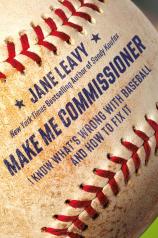Make Me Commissioner: I Know What's Wrong with Baseball and How to Fix It
Review
Make Me Commissioner: I Know What's Wrong with Baseball and How to Fix It
Back around the turn of the century --- especially in the wake of the 1994 strike that resulted in the cancellation of the remainder of the season --- several former baseball players and pundits published books on the problems with the game. Among them were a dwindling fan base due in part to competition from other diversions and starting times for games that were too late for the younger crowd, as well as feelings that the games were just too long.
As a result of the pandemic, Major League Baseball instituted new rules, including a pitch clock, to speed things up. This destroyed one of the cherished notions about the national pastime: without the clock in all other major sports, baseball theoretically could go on forever.
Even with these rules in place, baseball still has issues. Jane Leavy, who has written seminal biographies of three of the sport’s legends --- Babe Ruth, Mickey Mantle and Sandy Koufax --- brings her considerable knowledge and opinions in offering her take in MAKE ME COMMISSIONER.
So what is wrong with the game?
How much time do you have?
"Jane Leavy...brings her considerable knowledge and opinions in offering her take in MAKE ME COMMISSIONER.... Leavy is of my generation, and I give her props for having an open mind."
For one thing, Leavy believes there’s too much energy spent on numbers: “Playing for numbers has changed the way the game is taught.” Sure, statistics are a major part of the joys of baseball, but the newfound significance of such things as revolutions per minute for pitchers and bat velocity and launch angle for batters is taking over on every level, from Little League to the pro ranks. Teams and players are becoming slaves to the machine, as they look for any little advantage they can find. Trying to combat these new analytics is reminiscent of the scene from the film Moneyball where a group of grizzled scouts who have been working a certain way for decades are suddenly faced with a new way of doing things. But “[p]eople don’t come to see velo,” Leavy writes, “They come to see a story.”
And how the story has changed. When you consider a player for the Hall of Fame, you can’t use the same standards as just a decade or so ago. Starting pitchers throw fewer innings than ever before with a consequent reduction in wins. Where it used to be that you once needed at least 250 wins to be considered Hall material, that bar is now too high. Conversely, 500 home runs used to be a standard for hitters; now it almost seems low.
Leavy writes, “The problem is not having the information. It’s deciding what’s important,” and “Sometimes, it seems the players exist just to generate more data.” She also chastises MLB in the form of Commissioner Rob Manfred for gutting the minor leagues when he decided to cut more than 40 teams. Wouldn’t you think that’s counterproductive when you’re trying to increase interest?
Leavy traveled the country, meeting with former players and executives, and getting their opinions. Some of her ideas are worthy of further consideration, such as starting games earlier; free admission for younger kids, as well as reduced rates for families; making players more accessible by naming a “designated autograph signer” for each game; and monitoring youth baseball to prevent injuries. Others, with all due respect, seem silly, like having just two outfielders and doing away with over-the-fence home runs (granted, these aren’t all the author’s ideas; some come from people she’s interviewed along the way).
Leavy is of my generation, and I give her props for having an open mind. I totally agree with her sentiment that “Too much technology takes away from the beauty of the game.” I guess I fall into the demographic that likes the game as it’s always been, to be able to enjoy an afternoon in the sun without looking at the clock. But I don’t seem to count any more. For me, as she puts it, “Baseball lives at the intersection of history, memory, and nostalgia.” Nowadays, though, it seems the intersection has moved to somewhere between going to the mall, with its myriad food options and shops, and the Banana Ball phenomenon with its dances and bizarre rules, which some find entertaining. It may be entertaining, but to me that’s not baseball.
Reviewed by Ron Kaplan (www.RonKaplansBaseballBookshelf.com) on September 20, 2025
Make Me Commissioner: I Know What's Wrong with Baseball and How to Fix It
- Publication Date: September 9, 2025
- Genres: Nonfiction, Sports
- Hardcover: 384 pages
- Publisher: Grand Central Publishing
- ISBN-10: 0306834669
- ISBN-13: 9780306834660




